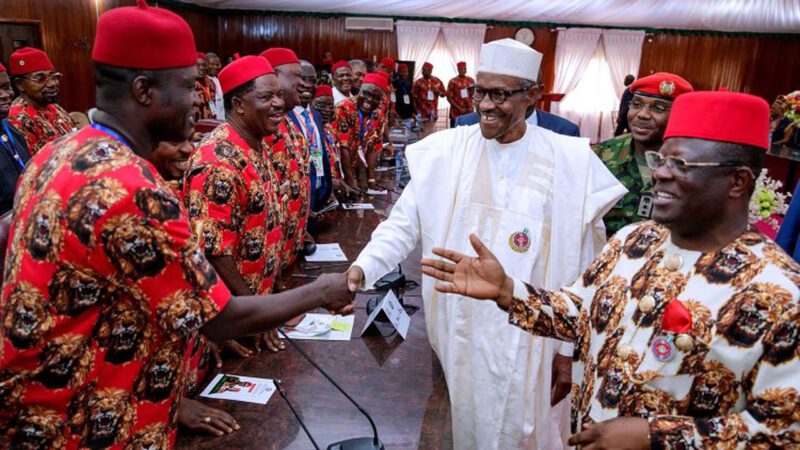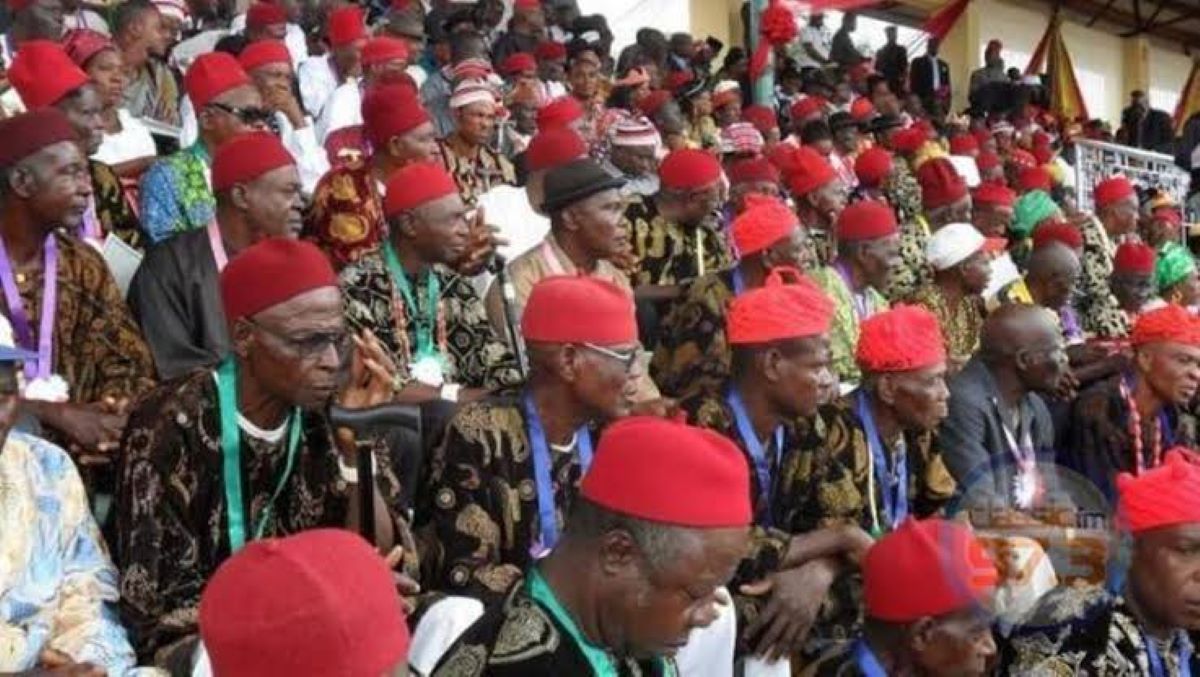The opinions presented in this piece are those of the author and do not necessarily represent InTv Media’s editorial position.Thank you.
It is not a coincidence that I am writing you three weeks to general election. The prevailing atmosphere in Nigeria is such that any Nigerian who can call on any other Nigerian to reason should not fold arms and watch as we not only disagree but continue to chide, malign and suspect one another while aimlessly moving from a more certain to an increasingly uncertain union.

Some history.

On Saturday June 12, 1993 Nigerians went to the polls to elect one of them to become their leader. But even as they turned out to vote, many of them were not sure that the soldier in charge was ready to hand over power to the winner. The Minna-born General had earlier cancelled presidential primaries, dissolved political associations formed by politicians and banned a good number of them from contesting elections. The two parties of SDP and NRC were his creation. The candidates were his close friends.
The June 12, 1993 elections left numerous lessons for Nigerians. However, the lesson that is relevant to this writeup is the tribalization of its outcome. During and before the campaign preceding the election, Abiola had never mentioned Yoruba, Hausa, Igbo or any of those. Of course, different people had different reasons for electing him. To the average Northerner, MKO Abiola was a philanthropist, a Muslim and in fact, the Deputy President of the Supreme Council of Islamic Affairs. To Christians, MKO Abiola was a liberal Muslim who did not react to people based on their faiths. To the Yoruba, he was a Yoruba man, etc.
READ ALSO: Buhari’s And Emefiele’s Last Game
MKO Abiola won and the election was cancelled by the same person who banned core Northerners like Shehu ‘Yaradua and Adamu Chiroma from participating in politics. However, unlike other Nigerians who saw the cancellation as just one in the series of attempts by IBB to perpetuate himself in power, the Yoruba establishment saw it as a tribal war.
The Hausa man, whatever that means, was considered the enemy and was incessantly scolded on the streets of cities in the South West, especially Lagos. If they were seen with a good car or even a beautifully sewn agbada it was because their brother was in Government and was sharing stolen money with them. NADECO, OPC and human rights groups were used as tools to champion the tribal agenda. Democracy meant June 12 election. Either Abiola was sworn in or there will be no Nigeria.
For the five years that Abatcha wielded power he brutally tramped on tribalists and very much like his predecessor wanted to continue to rule for as long as he could. Unfortunately, people in the south viewed the power lust of IBB and Abatcha as a grand plan by Northerners to hold on to power. They failed to understand that if the Generals were following some master plan to retain power to the North, the 1983 and 1985 coups, the cancellation of election results by IBB even before June 12 1993 election and dissolution of political parties by him would not have taken place. There wouldn’t have been any problem with Northerners using their numerical strength to retain power unchallenged.
I was not there when decisions were taken to kill major players in the post June political scene; just like most other Nigerians, I only saw it happen. First, Shehu ‘Yaradua died. Then Abatcha. Then Abiola. I don’t know who took those decisions, but I still believe that those deaths are too organized to be a coincidence. You would agree with me, however, that just like the Nigerian civil war those deaths brought about some degree of stability in the polity. It is better to lose just three people than to lose two million people like it happened thirty years earlier.
The biggest mistake came in 1999 when a Yoruba man was picked from prison, granted a presidential pardon and given the presidency on a platter of gold. While it appeased the June 12 propagandists, it motivated other nationalities to seek power using the same method Yoruba people used. It gave the impression that the Northerner is a timid coward who would accept anything when threatened with the dissolution of the colonial marriage called Nigeria. It was perhaps to confirm this that Yoruba tribalists under the aegis of OPC launched the massacre of Northerners in which tens of them including women and children were killed on the streets of Lagos and Sagamu not long after Obasanjo took over power in 1999. As expected, nothing happened. OPC got away with it and Northern leaders turned a blind eye for fear of breaking up the country.
Finally, another battlefield is here. The 2023 election. Unlike before, the Igbo nation has avoided the mistake of fielding multiple candidates. There is only one candidate. He is the candidate of Ohaneze. He is the candidate of the people. All Igbo people, with the exception of those benefitting from Government will vote for him. At least this is the conclusion I have drawn from my personal interaction with Igbo friends and closely following discussions in both the regular and social media.
However, it is obvious that the Igbo candidate cannot make it due to problems created by himself and/or his kinsmen like you.
First, while similar groups like Afenifere and the ACF refused to outright endorse candidates from their regions, Ohaneze did not mince words in telling everyone that it has only one candidate that it is supporting with all its resources including a few billions of Naira for campaign. While it has asserted its right, it has failed to learn from history. No regional candidate has ever won a national election in Nigeria. Obasanjo won the 1999 election only after being disowned by his people. The southwest overwhelmingly voted for Falae and he lost.
Despite being elected by Northern majority in 2003, 2007 and 2011, Buhari did not make it to Aso Rock. He did so only after entering into an alliance with the South-West. That is exactly what NPC did in 1963 and NPN in 1979. I am surprised that despite the calibre of people who constitute Ohaneze it cannot see this. My hope is that it has a plan to manage the imminent defeat which, due to its approach, shall be seen by many as a defeat of the Igbo people.
READ ALSO: Revolutionary Vote From Mindset Reset
Since the other major candidates are considered to be either Fulani or their protégés, the Igbo candidate and his handlers are seen busy courting groups considered to be against the so-called Fulani hegemony. Unfortunately for your candidate, Nigerian politics doesn’t work that way. Many non-Fulani Nigerians prefer working with Fulani because they know from experience that it is only the Muslim Northerner (politically referred to as Fulani) that disadvantage their people to appease others. That is the very reason why Muslim Northerners are suffering more than any other people despite being seen as the most influential political group in Nigeria.
My Igbo compatriot, why don’t you come out of this and open-mindedly look at the Nigerian union? I would like to observe that you have more advantage than any other person in Nigeria. You have more investments in all parts of this country more than any other person has. Thus, in the event of a political riot or dismembering of Nigeria you stand to lose more than I do.
Moreover, assuming Nigeria ceases to be which you and only you seem to be interested in, have you considered living in a landlocked piece of land not as big as a combination of any two states of Northern Nigeria? The southern minorities are not interested in Biafra this time around. Thus, the new Biafran would need a Nigerian visa to travel to any part of the world or at least permission for a Biafran airline to pass through the Nigerian airspace. Don’t you think that will be more disgraceful than losing an election?
Again, as things stand, no group of people or tribe can be said to own this country. Since the coup against Ironsi, subsequent Nigerian leaders have worked to make sure that each part of the country is carried along in governance. It was eventually entrenched in the constitution. Both APC and PDP Governments have not only maintained the provisions of the constitution in appointing at least a Minister from each state, they have also made sure that appointments to strategic ministries are shared among the six geopolitical zones. That is why it is difficult to convince Nigerians to accept an obscure party especially one being promoted by tribal champions.
Talking about an obscure party, I live in a state in which another politician has left the mainstream to join a party not more popular than the party of your candidate. What has made his previously unknown party popular in this state is what made the party of your candidate popular in the South East, i.e. the personality. Just like your candidate, he has supporters who are ready to live and die for him.
Although given his pedigree he knows what he wants, his cult-like supporters do not. Even if they do, their vision is not clear enough to see that there is no light at the end of the tunnel. That is another extreme, but better than yours. At least there are indications that the Kano politician will throw his weight behind one of his friends vying under a major political party. They are, after all birds of the same feather. It is commoners who are deceived into believing that there is a difference.
If I were an Igbo man, I would raise my voice to call on all Igbo people to eschew tribalism and refuse to vote for an unpopular candidate just because he is Igbo. I would advise Igbo people to learn from history and avoid anything that would lead to a repeat of the 1967 bloodshed just because someone is interested in power. Elections come and go and losing an election is not a death sentence.
If I were an Igbo man I would advise the Igbo candidate to retract his steps and come back to the mainstream political groupings. If he left PDP because he doesn’t want another Fulani man to become the President I would advise him to look for Asiwaju and pledge support. This would surely bring peace and harmony in the political arena and pave way for all Nigerians including Igbo to fully participate in governance including a future Nigerian president from the South East.
By the way, how much difference is there between Asiwaju, Atiku, Kwankwaso and Obi? Each of them knows what is right even if he does the wrong thing.
Professor Abdussamad Umar Jibia



















